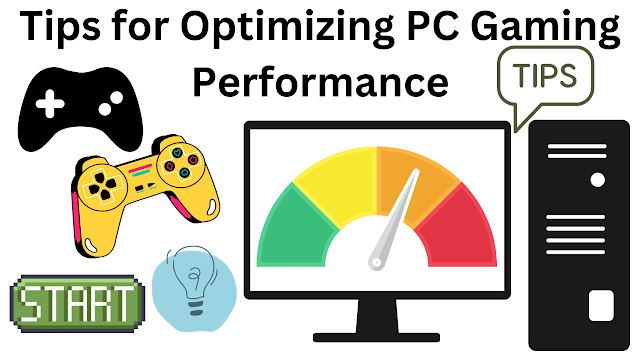Tips for Optimizing PC Gaming Performance
Introduction
PC gaming has become more popular, with an ever-expanding library of games and increasingly demanding graphics. To fully enjoy your gaming experience, it's essential to optimize your PC's performance. Whether you're a competitive esports player or a casual gamer, these tips will help you get the most out of your gaming rig.
 |
| Tips for optimizing PC gaming performance. |
Hardware Upgrades
Upgrading Your Graphics Card
One of the most significant factors influencing gaming performance is your graphics card. A more powerful GPU can handle higher resolutions, better textures, and smoother frame rates. We'll explore how to choose the right graphics card for your needs.
Adding More RAM
RAM (Random Access Memory) plays a crucial role in gaming performance. We'll discuss how increasing your RAM can reduce loading times and prevent stutters during gameplay.
Solid-State Drives (SSDs) for Faster Load Times
Loading screens can be the bane of a gamer's existence. Upgrading to an SSD can significantly reduce load times and improve your overall gaming experience. We'll guide you through the process of selecting and installing an SSD.
Software Tweaks
Updating Graphics Drivers
Outdated graphics drivers can lead to compatibility issues and decreased performance. Learn how to update your graphics drivers for smoother gaming sessions.
Optimize In-Game Settings
Adjusting in-game settings can make a world of difference. We'll provide a breakdown of graphical settings like resolution, texture quality, and anti-aliasing, helping you strike the right balance between visual fidelity and performance.
Overclocking Your CPU and GPU
For advanced users, overclocking can unlock additional performance from your CPU and GPU. We'll explain the basics of overclocking and offer safety precautions.
PC Maintenance
Keeping Your PC Clean
Dust and debris can accumulate inside your PC, causing it to overheat and perform poorly. We'll guide you on how to clean your PC and maintain optimal temperatures.
Managing Background Processes
Unnecessary background processes can hog system resources. We'll show you how to identify and close resource-hungry applications while gaming.
Network Optimization
Wired vs. Wireless Connections
A stable internet connection is crucial for online gaming. We'll discuss the pros and cons of wired and wireless connections and how to optimize each.
Quality of Service (QoS) Settings
If you share your network with others, QoS settings can help prioritize gaming traffic. We'll explain how to set up QoS on your router to reduce lag.
Monitoring and Performance Tools
Utilizing Performance Monitoring Software
There are various software tools available to monitor your PC's performance in real time. We'll introduce you to popular options and explain how to use them effectively.
Benchmarking Your System
Benchmarking your PC can help you assess its current performance and track improvements over time. We'll walk you through benchmarking tools and methodologies.
List: Essential Tips for PC Gaming Performance
- Keep Your Drivers Updated: Regularly update graphics cards and other hardware drivers.
- Find the Right Balance: Adjust in-game settings for the sweet spot between visuals and performance.
- Optimize Your Startup Programs: Disable unnecessary startup applications to free up system resources.
- Use Game Mode: Enable Windows Game Mode for an optimized gaming experience.
- Regularly Clean Your PC: Prevent overheating by cleaning dust and ensuring proper airflow.
- Upgrade Your GPU: Consider a GPU upgrade for a substantial performance boost.
- Consider Overclocking: Advanced users can experiment with overclocking, but proceed with caution.
Table: Graphics Settings Comparison
| Setting | Impact on Performance | Visual Quality |
|---|---|---|
| Resolution | High | Improved clarity |
| Texture Quality | High | Detailed textures |
| Anti-Aliasing | Moderate to High | Smoother edges |
| Shadow Quality | Moderate to High | Realistic shadows |
| Ambient Occlusion | Moderate to High | Enhanced lighting effects |
Conclusion
Optimizing your PC gaming performance is not a one-size-fits-all task. It involves a combination of hardware upgrades, software tweaks, regular maintenance, and network optimization. By following the tips and techniques outlined in this comprehensive guide, you can ensure that your PC is ready to deliver an exceptional gaming experience. Remember that each PC is unique, so don't be afraid to experiment and find the settings that work best for your specific setup. With a well-optimized gaming PC, you'll be able to immerse yourself in your favorite games without any performance hiccups, providing you with the ultimate gaming experience.